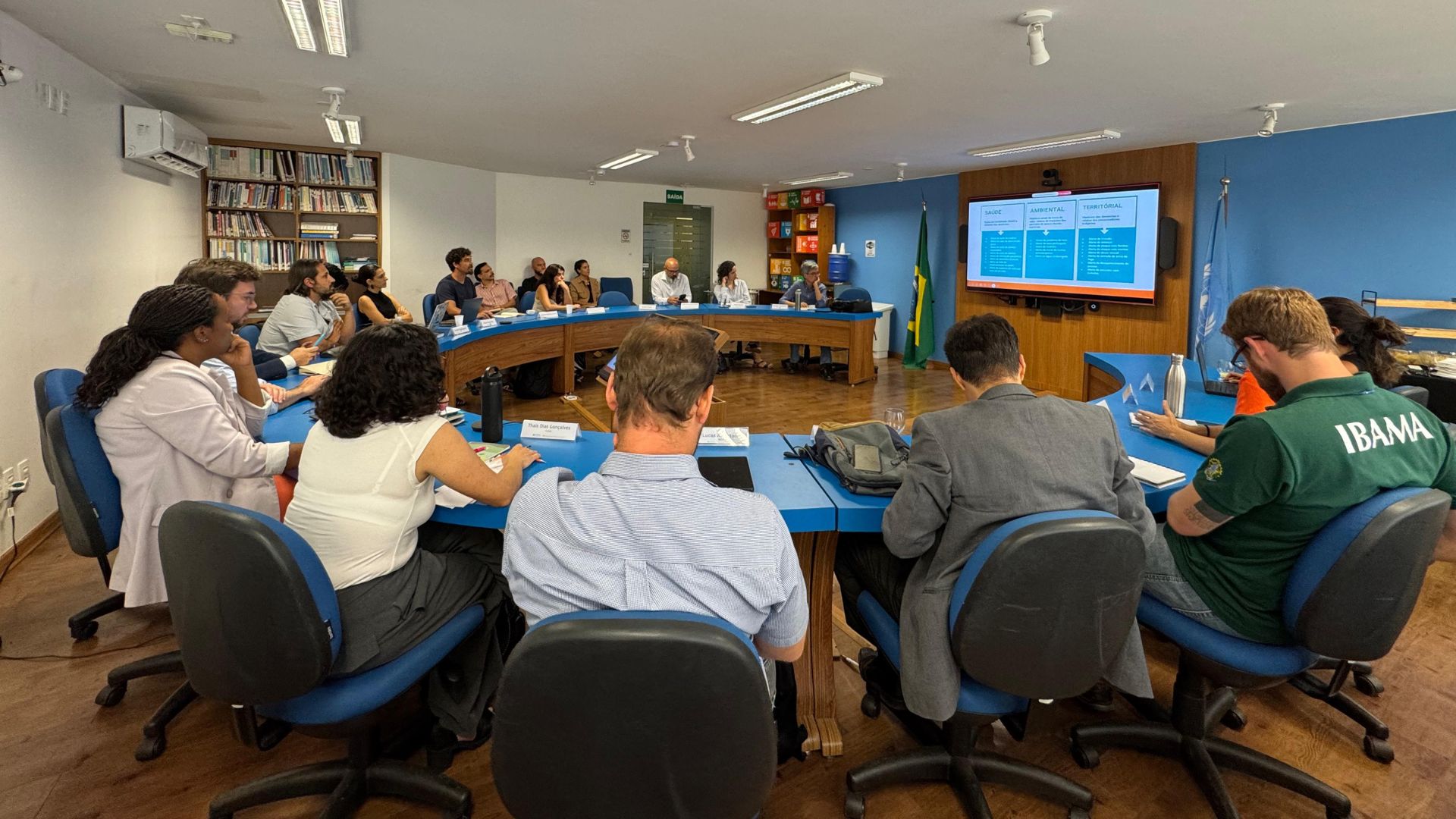
Brasilia-DF, 1 October 2024 - The United Nations Office on Drugs and Crime (UNODC) in Brazil organized and hosted, on 24 September, in Brasilia, Federal District, the second meeting of the Interinstitutional Working Group (WG) on Surveillance for Indigenous Territorial Protection.
Held as part of the SAR-TI project - Strengthening Early Warning and Response Systems for Environmental Crimes related to Illegal Gold Mining in Indigenous Territories, with support from the Italian Ministry of Foreign Affairs and International Cooperation (MAECI), the meeting was attended by 32 participants, including representatives from federal institutions, civil society and academia.
The second meeting of the WG consisted of a technical and integrated dialogue on how to move forward in standardizing and systematizing mechanisms for preparing, monitoring, early warning and responding to environmental crimes in indigenous territories. Members of the WG also pondered on ways to mitigate risks and impacts related to these crimes, especially illegal mining.
Among the topics covered is the structuring of a Comprehensive Glossary, which is being collaboratively elaborated by the members of the WG and will guide the terminology related to indigenous territorial protection, risks, impacts and processes. The results of the exercise to evaluate the surveillance system within the scope of indigenous territorial protection, carried out by the Yanomami/Yekwana indigenous organizations was also presented and discussed during the meeting. The methodological proposal for this exercise was developed by the UNODC for evaluating surveillance systems in the context of indigenous territorial management.
The discussion also covered regulatory proposals for territorial protection and disintrusion led by the Ministry of Indigenous Peoples (MPI). Additionally, the National Foundation for Indigenous Peoples (FUNAI) presented the design of a model for an integrated channel to receive notifications and complaints related to territorial protection.
The process of integrating the Special Indigenous Health Districts (DSEIs) into the network of the Center for Strategic Information and Health Surveillance Response (CIEVS) of the Ministry of Health's Secretariat for Health and Environmental Surveillance and the proposal to structure a surveillance and early warning platform led by the Secretariat for Indigenous Health (SESAI) were also presented.

At the next meeting of the WG, to be held in November, a proposal will be presented for a platform that will systematize preparedness, early warning and response mechanisms, as well as recommendations on how to create response plans and structured programs to tackle environmental crimes related to illegal mining in indigenous territories.
The first meeting of the Interinstitutional Working Group on Surveillance for Indigenous Territorial Protection took place in May 2024 and discussed criteria for evaluating official and community-based territorial surveillance systems, as well as impact indicators and response flows to different crimes - including those related to illegal mining - in Indigenous Territories.
ABOUT THE WG The Interinstitutional Working Group on Surveillance for Indigenous Territorial Protection, comprising over 15 institutions, aims to gather critical information to support the development of effective policies for indigenous territorial protection. Its focus is also on enhancing the prevention and control of the impacts caused by environmental and other crimes within these territories.
The WG's member institutions are: Ministries of Indigenous Peoples (MPI), Justice and Public Security (MJSP), Environment and Climate Change (MMA), Health (MS) and Development and Social Assistance, Family and Fight against Hunger (MDS); Regional Development (MDR); Human Rights and Citizenship (MDHC); National Foundation for Indigenous Peoples (FUNAI); Federal Police (PF); Brazilian Institute for the Environment and Renewable Natural Resources (IBAMA); Chico Mendes Institute for Biodiversity Conservation (ICMBio); Federal Public Prosecutor's Office (MPF); Comptroller General of the Union (CGU); Federal Public Defender's Office (DPU); Embassy of Italy in Brazil; Articulation of Indigenous Peoples of Brazil (APIB); and Coordination of Indigenous Organizations of the Brazilian Amazon (COIAB).
There are also organizations observing the discussions, such as WWF Brasil, the Amazon Environmental Research Institute (IPAM), the Socio-Environmental Institute (ISA), the United Nations Children's Fund (UNICEF), the United States Department of Agriculture Forest Service (USFS) and the Getúlio Vargas Foundation - Center for Sustainability Studies (FGV EAESP).
SAR-TI - SAR-TI is an initiative of the United Nations Office on Drugs and Crime (UNODC), supported by the Ministry of Foreign Affairs and International Cooperation (MAECI) of the Government of Italy. Its aim is to support and foster the articulation of indigenous associations and organizations, government institutions and civil society for the structuring, strengthening and integration of mechanisms for preparation, monitoring, early warning and response to environmental and other crimes in indigenous territories, with a focus on areas affected by illegal gold mining in the Amazon.